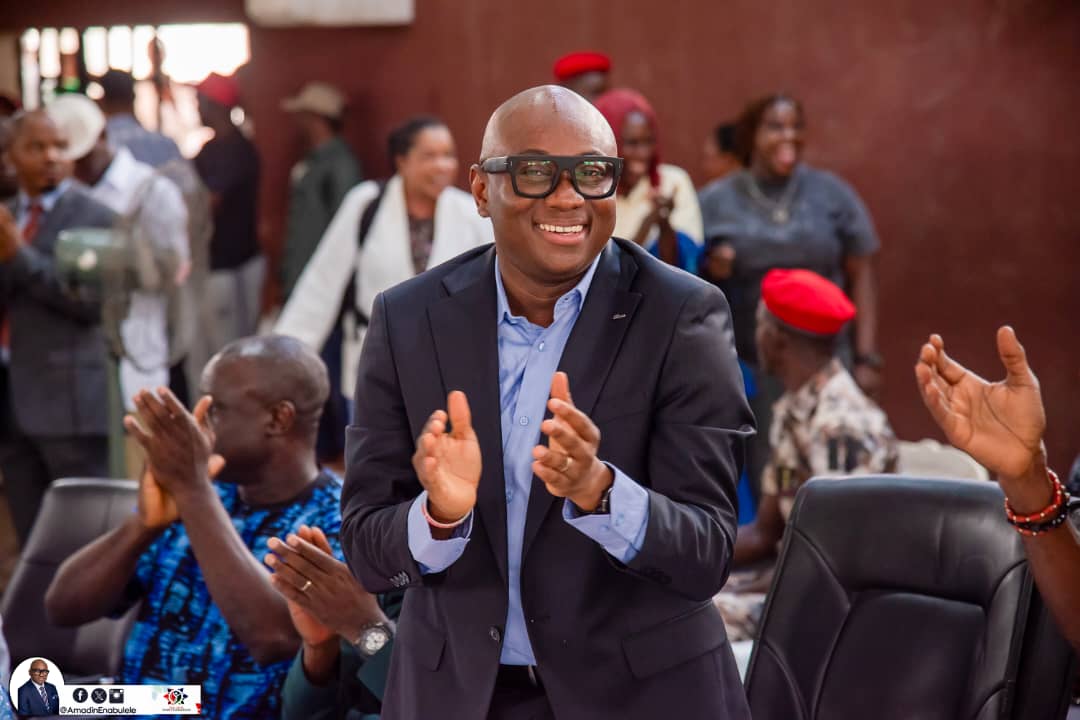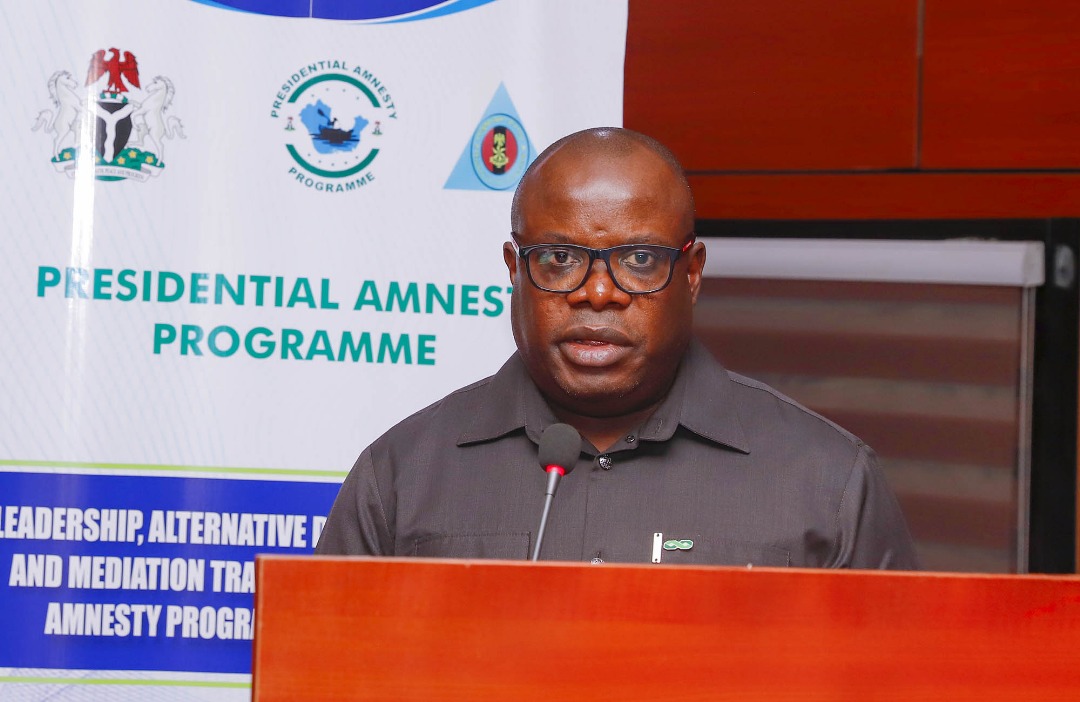News
[OPINION] The Unkingly Timi And Lousy Wasiu Ayinde (1)

Tunde Odesola
If only the eyes could unsee the seen, the sin of abomination would fall off the heart; the scene of sacrilege would fade away from the mind; taboo and its punishment would remain in the communal pouch; and blood would not race higher than its pressure; life would be good. The soul would be at peace…if.
But the eyes cannot unsee that tragedy in Ilorin, where the reincarnated warrior with flaming arrows, the Timi Agbale of Ede, Oba Munirudeen Lawal, knelt to an ancestrally younger authority, the Emir of Ilorin, Alhaji Ibrahim Sulu-Gambari. Abomination! Orí ó gbodó di írú: the head must not become the tail, says a Yoruba proverb.
Many eyes saw the eyesore and mouths flung wide open like crocodiles regulating body temperature on a sunny day, leaving many wondering if that horror truly happened in Ilorin Afonja founded by the Yoruba or if that was a scene from an episode in a mediocre movie titled, “The Timid King”.
Founded by Oyo Empire authorities in the 16th Century, Ede is not only older than Ilorin, which was founded in the 18th Century, Ede was also a frontier military outpost of the Old Oyo Empire with Aare Ona Kakanfo Afonja as the field marshall.
In the “History of the Yorubas”, Samuel Johnson says before the collapse of the Oyo Empire in 1796, a succession of Timis reigned in Ede-Ile, marking out the land of Mapo Arogun as one of the strongest military powers in Yorubaland.
By genealogical, cultural and traditional indices, the Timi stool, by a vast margin, predates the Ilorin emirate. In their seminal book, “The Entire Yorubaland”, Professors Isaac Akinjogbin and S. A. Akintoye, affirmed Ede as one of the established monarchies in Yorubaland – long before the birth of the caliphate in post-1800, let alone the Ilorin emirate, whose first emir reigned between1823 and 1836.
MORE FROM THE AUTHOR: OPINION: The Day Alcohol Showed Me Shégè (2)
This viewpoint is vividly expressed in the book, “Yoruba Warfare in the 19th Century”, written by Professor J.F. Ajayi, and “War and Peace in Yorubaland”, edited by Professor I. A. Akinjogbin. While Ilorin was a theocratic state, Ede was both a military and traditional state.
Oral tradition says the etymology of Ilorin is rooted in three Yoruba expressions: (1) Ìlo Irin (Iron Sharpening), (2) Ìlú Irin (Iron Town) and (3) Ìlú Erin (Elephant Town). Ìlo Irin suggests that the name Ilorin was derived from iron sharpening practice by its occupants. It connotes that Ilorin is a place noted for iron sharpening in its early days.
Ìlú Irin suggests that the name Ilorin evolves from iron smelting in the area while Ìlú Erin implies that the community is probably associated with elephants.
Also, a myth says Oláderin was a popular elephant hunter in the locality and that Oko Erin, the name of a settlement in Ilorin, shows the town’s relationship with elephants.
Ede is a town with a rich history and incredible people. Long after the reign of the first Timi Agbale Olofa Ina, Ede remains a town of no-nonsense indigenes – going by the way its people fiercely defend Abere, a large portion of Ede land – from external incursion.
Ede is a town I love. It was the first town I visited upon my arrival from Lagos State as state correspondent of The PUNCH in 2003. It was my first week on the job and I was about to go back to Lagos for the weekend when the multitalented Olumide Ajayi barged into my office and said, “Ha, egbon, e je ki a wo town; let’s go and have a drink.” “No, as you see me so, na Lagos I dey,” I replied him. “Ha, egbon, e le lo o. You can’t go; you must see my principal,” Olumide insisted. But I responded, “I’ll see your principal when I return.” “Ha, no, o ti o. Ede is just 10 minutes from Osogbo. It’s on the way to Lagos, we’ll just branch, see my principal and you’ll be on your way to Lagos,” he maintained. “Ok,” I gave in.
MORE FROM THE AUTHOR: OPINION: The Day Alcohol Showed Me Shégè (1)
Olumide jumped into my car and we drove to the residence of the first public figure I made friends with in Ede, Rt. Hon. Adejare Bello, a former Speaker of the Osun State House of Assembly and former Ambassador to Mexico with concurrent accreditation to Costa Rica, Guatemala and Panama. May Olumide’s soul continue to rest in peace.
An embodiment of charisma, tact, intelligence and integrity, the immediate past Timi of Ede, Oba Tijani Oladokun Ajagbe Oyewusi, the Agbonran II, ruled from 1976 to 2008. Through a colleague, Wale Folarin PhD, I later came to closely know the colourful Oba Oyewusi, who stood for peace and united Ede sons and daughters at home and abroad.
A man of vision, class and character, the great Timi Oyewusi was schoolmates with the late Ooni of Ife, Oba Okunade Sijuwade; the late Apetu of Ipetumodu, Oba Olaolu Ayoola; the late Justice Bolarinwa Babalakin, the late Chief Richard Akinjide (SAN), at the Oduduwa College, Ile-Ife.
Later, I became friends with the first executive Governor of Osun State, Senator Adetunji Isiaka Adeleke aka Serubawon, a jolly good fellow and gentleman. One day, Serubawon called me, “Tunde, I have an advert for you. Can you, please, come to the country house in Ede?” “I’m on the way, sir,” I said.
By the time I got to Adeleke’s home in Ede, the sun was fully up, but Adekele had lost his shine. I asked if there was anything the matter and he replied tersely, “We lost a family member.”
He gave me the artwork of the advert; it was an obituary of an extremely beautiful woman. “I don’t know where my chequebook is,” he said, looking for a piece of paper. He asked me the amount of the full-page colour advert, and I told him. Serubawon scribbled the amount on the piece of paper, signed it and gave it to me. “Please, go to Pacific Bank and ask for the manager. I’ll call him before you get there.”
The manager and the accountant of the bank were at the gate waiting for me. I presented the paper to them and they gave me the advert fee with tonnes of courtesy. I headed straight to the office to process the obituary of Mrs Vero Imade Adeleke PhD, Davido’s mother.
MORE FROM THE AUTHOR: OPINION: The Cockroach Called Dele Farotimi (2)
I also know some other Ede politicians. They include ex-Ede LG chair, Alhaji Kamarudeen Adegoke; Dr B.T Salam, OSHA member, Taofeek Layiwola; Osun Special Adviser, Sunday Atidade; ex-House of Reps member, Mufutau Ayinde; the late Pa Fatai Rolling Dollars, the late Peoples Democratic Party chieftain, Alhaji Laide Adeniran, who invented the popular political slogan, “Change ese re, Ede lo wa, Ede lo de,” among others.
I do not know for how long the reigning Timi stayed in ìpèbí – Yoruba’s kings’ college – but I know that no ìpèbí in the Land of Oduduwa will approve an oba to kneel in greeting to anyone mortal. This is why what the Timi did in public in Ilorin was an abomination. It was unheard of. It was an insult to the rich history of the Yoruba. I wished it was not the Timi.
I wished the Timi had just kept quiet after committing the taboo. But no, he did not. He issued a terrible statement in support of the sacrilege.
Timi’s statement said, “Oba Lawal, having an imposing frame, bent to exchange pleasantries with the Emir because Alhaji Sulu Gambari, possibly due to his age or other personal reasons, could not stand to greet the guests who went to pay him homage.
“At first, Oba Lawal leaned towards Sulu Gambari to greet him, but because the Emir could not still hear greetings from his visitor, Baba Timi had to bend and move closer for clearer communication to take place.
“We also note that it was not only Baba Timi that Emir Sulu Gambari did not rise on his feet to greet. The Emir did not leave his seat to greet any of the guests who entered the inner chamber to meet him.”
Timi’s statement elicits some questions, “Is the Timi saying Alhaji Sulu-Gambari hears better when subjects kneel to speak to him than when they move inch-close to him? “Does kneeling to Emir Sulu-Gambari bring his subjects closer to him than when they move some inches close to him while standing?” The Timi said in his statement that he bent? Did he bend or kneel? And must he kneel to move close to Sulu-Gambari?
I’m sure the Timi knows this Yoruba proverb, but if he does not, here’s it: Ka ka ki n dobale fun Gambari, ma kuku ku! It means, “Instead of me to prostrate to Gambari, I rather die.”
To be continued.
Email: tundeodes2003@yahoo.com
Facebook: @Tunde Odesola
X: @Tunde_Odesola
News
Grassroots To Global Podium: Edo Sports Commission Marks Enabulele’s First Year In Office

The Indoor Sports Hall in Benin City came alive on Wednesday as the Edo State Sports Commission rolled out the drums to celebrate the first anniversary in office of its Executive Chairman, Hon. Amadin Desmond Enabulele. Management, staff, coaches and athletes gathered in an atmosphere charged with pride, reflection and optimism.
The colourful ceremony drew executives and members of various sports associations, officials of the Sports Writers Association of Nigeria (SWAN), coaches, athletes and other key stakeholders in Edo sports.
In her welcome address, the Acting Permanent Secretary of the Commission, Mrs. A. P. Amenze, praised Hon. Enabulele for what she described as focused and purposeful leadership. She said the past year had seen renewed confidence, discipline and energy return to the state’s sports ecosystem.
Adding excitement to the event were exhibition bouts and demonstrations by the Kung Fu, Karate, Taekwondo and Judo associations, staged in honour of the Executive Chairman.
READ ALSO:2025 NYG: Enabulele Charges Edo Coaches On Performance
Speaking for SWAN Edo State, Chairman Comrade Kehinde Osagiede commended Hon. Enabulele’s open-door leadership style and consistent support for sports development. He noted that the Commission had effectively driven Governor Monday Okpebholo’s “Catch Them Young” policy through practical grassroots programmes that identify and groom young talents across the state.
In recognition of his contributions to sports development and media relations, Comrade Osagiede conferred the Patronship of SWAN Edo State on Hon. Enabulele and presented him with a special anniversary card.
Goodwill messages followed from Executive Directors of the Commission, including Hon. Frank Ilaboya (Edo North), Coach Baldwin Bazuaye, MON (Edo South), Barr. Anthony Ikuenobe (Edo Central), and Mrs. Sabrina Chikere, Executive Director, Sports Development and Operations. Representatives of coaches, athletes and sports associations also took turns to acknowledge the progress recorded under the current leadership.
In his stewardship address, Hon. Enabulele expressed gratitude to Governor Monday Okpebholo and Deputy Governor Rt. Hon. Dennis Idahosa for the trust placed in him, noting that their backing and shared vision had driven the Commission’s achievements.
READ ALSO:Enabulele Lauds Okpehbolo For Creating Enabling Environment For Football To Thrive
He highlighted Team Edo’s third-place finish at the 9th National Youth Games in Asaba, where the state recorded its best-ever outing with 79 medals—33 gold, 18 silver and 28 bronze—reinforcing Edo’s reputation as a national sports powerhouse.
The Chairman also pointed to the impact of inclusive and grassroots sports programmes, citing Favour Ojeabu, a visually impaired para-cyclist who won three gold medals to emerge Africa’s champion at the African Track Para-Cycling Championship in Egypt.
Other milestones listed included outstanding performances by Edo para powerlifters on the international stage, historic achievements in cricket, weightlifting, cycling, judo and deaf athletics, as well as structural reforms such as the repositioning of Bendel Insurance FC and deeper investment in grassroots sports development.
Cultural performances added colour and tradition to the celebration, as stakeholders closed the event united in their assessment of the past year as a truly transformative period for sports development in Edo State.
News
Otuaro Tasks Media On Objective Reportage

The Administrator, Presidential Amnesty Programme (PAP) Dr. Dennis Otuaro has charged media practitioners particularly members of the Ijaw Publishers’ Forum to promote ethical journalism through their reportage.
He gave the charge in Warri on Wednesday during the 2nd Annual Ijaw Media Conference organised by the Ijaw Publishers’ Forum (IPF).
Represented by Princewill Binebai, spokesman, Ijaw Youth Council (IYC) Worldwide, Otuaro while stating that the Niger Delta stories have been told in such a way that is quite different from what is obtainable in the real sense, said this, IPF must do everything possible to correct.
The administrator added: “I am happy that Ijaw journalists have boldly come out together to champion the Ijaw struggle in a very dynamic perspective”.
READ ALSO:IPF Hosts Media Conference, Seeks Protection For N’Delta Environment
“The Ijaw story was misrepresented over the years, but IPF’s emergence had corrected this error and the story is gradually changing for better.”
Otuaro, however, challenged Ijaw media practitioners to be objective, truthful, accurate and fearless in their reportage to correct many years anomalies of the Ijaw struggle.
He admonished members of IPF to see themselves as brothers and love one another in the discharge of their activities to achieve a common goal.
News
Police Confirm Edo Tanker Explosion, say No Casualty

The Edo State Police Command has confirmed tanker explosions that rocked Auchi, the administrative headquarters of Etsako West Local Government Area of the state.
The Command’s Police Publice Relations Officer, Eno Ikoedem, who confirmed the incident via the phone, said the explosion occurred at about 6:30 p.m. following the fall of a fuel tanker along the road.
Ikoedem said the incident occurred on Wednesday evening at about 6:30 p.m. following the fall of a fuel tanker along the road.
READ ALSO:Edo SSG Calls On Media To Support Govt Policies, Assures Better Welfare
She explained that spilled fuel seeped into underground tunnels, which later ignited and caused three explosions in different parts of the Auchi community.
According to her, officers from the Auchi Divisional Police Headquarters and the Area Command were mobilised to the affected areas and successfully cordoned them off to prevent loss of lives.
She added: “No casualty was recorded. Our men on ground were able to cordoned the affected areas.”
READ ALSO:Edo Assembly Declares Okpebholo’s Projects Unprecedented
It was gathered that three separate explosions rocked the town simultaneously in different parts, which led to properties worth millions of naira destroyed.
A resident who does not want his name in print said via the telephone that the blasts occurred along Igbei Road, Igbo Shade, and along the Auchi–Okene Road, close to Winners Junction.
The resident, who alleged the explosions appeared to have been coordinated, called for a thorough investigation into the incident to prevent future occurrences.
Calls put across to Mr. Monday Edogiawere, Chairman, Red Cross, Edo State, were not picked.

 Metro4 days ago
Metro4 days agoSuspected Kidnappers Abduct 18 Passengers On Benin-Akure Road

 News4 days ago
News4 days agoI’m Not Distracted By Anti-Niger Delta Elements, Says PAP Boss, Otuaro

 News4 days ago
News4 days agoOPINION: Time For The Abachas To Rejoice

 News3 days ago
News3 days agoWage Dispute: Court Orders PSG To Pay Mbappe €61 Million

 Sports3 days ago
Sports3 days agoJUST IN: Dembélé Named FIFA Best Men’s Player, Bonmatí Wins Women’s Award

 News4 days ago
News4 days agoEdo Assembly Charges Contractor Handling Ekekhuan Road To Accelerate Work

 Metro4 days ago
Metro4 days agoNDLEA Seizes 457kg of Cannabis, Arrests Suspected Trafficker In Edo

 Headline3 days ago
Headline3 days agoAircraft Crashes In Owerri With Four Persons Onboard

 News3 days ago
News3 days agoOPINION: Man-of-the-people, Man-of-himself

 Business3 days ago
Business3 days agoCBN Revokes Licences Of Aso Savings, Union Homes As NDIC Begins Deposit Payments
























